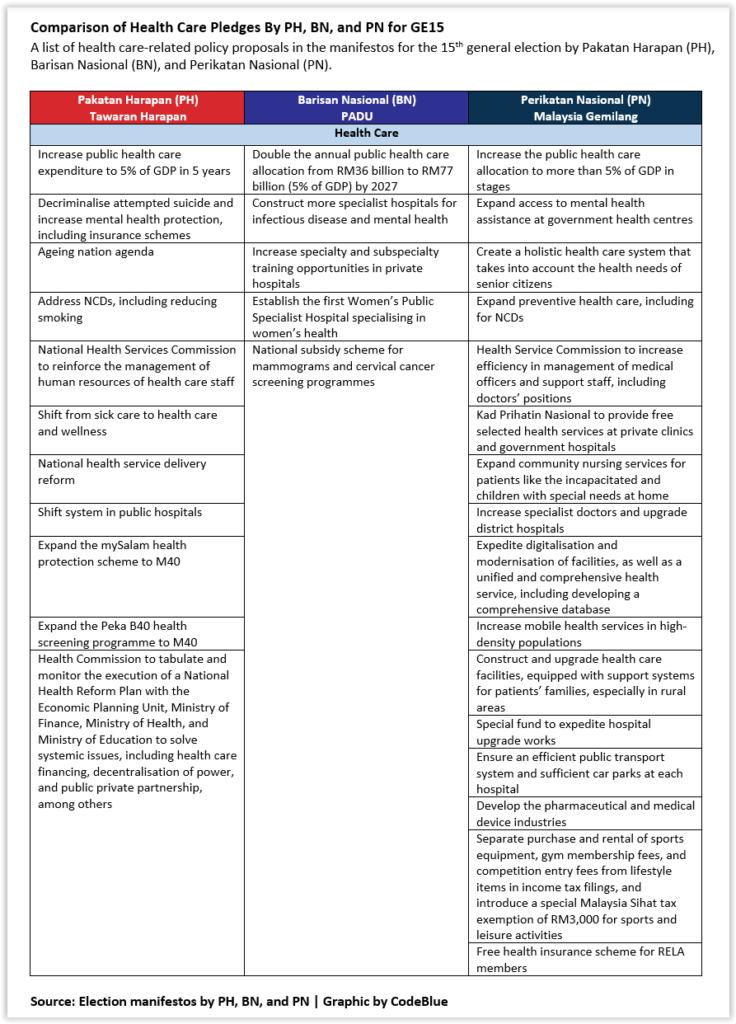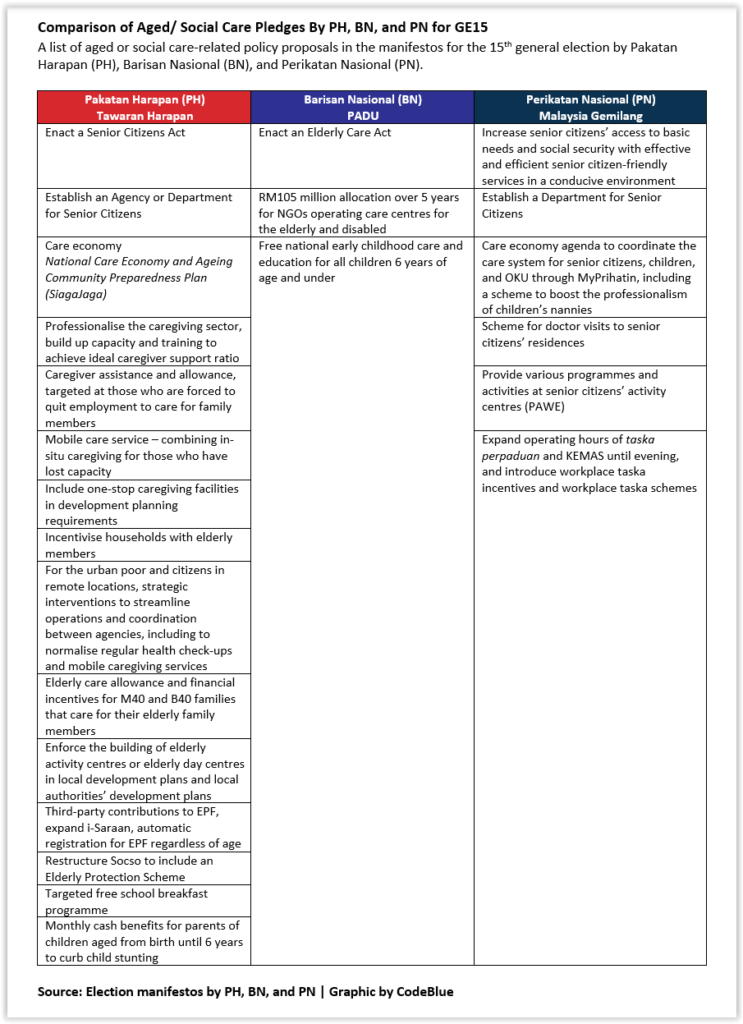KUALA LUMPUR, Nov 9 – Malaysia’s health care system has been unsustainable for decades, with lagging health indicators as we fall behind neighbouring countries that are supposedly less developed than us.
With global 2030 health goals fast approaching, the next elected government must begin serious health care reform efforts and put respective policies and systems into place in a single term, instead of just making plans and postponing the hard work to the subsequent term.
The election manifestos by Pakatan Harapan (PH), Barisan Nasional (BN), and Perikatan Nasional (PN) for the 15th general election illustrate each coalition’s respective understanding and approach towards managing the country’s ailing health care system.
Despite having a reform-minded former health minister in Khairy Jamaluddin, BN’s manifesto shows an utter lack of interest in health, social and aged care.
BN makes the completely unrealistic promise to double the annual public health care allocation from RM36 billion to RM77 billion – the oft-touted 5 per cent of Malaysia’s gross domestic product (GDP) – in five years by 2027, without proposing new taxes or cuts to Malaysia’s projected subsidies bill of RM77.7 billion this year.
When Khairy was in office, he targeted 2030 to double the public health care budget to 5 per cent of the GDP, without specifying an amount.
Other than (fancifully) throwing a lot of money, the rest of BN’s pledges for health, social and aged care are merely about building more hospitals, even though one of the main issues with the public health care system is staffing due to insufficient funding.
Instead of having the State take on the responsibility of providing affordable aged care, BN passes the responsibility to non-governmental organisations by simply proposing to dole out government allocations. Even then, RM105 million over five years – RM21 million annually – is likely far from enough.

PN’s manifesto is significantly better than BN’s. For example, PN’s pledge to increase the public health care allocation to 5 per cent of the GDP “in stages” is much more realistic than BN.
PN is also rather thoughtful in proposing to make use of existing infrastructure and support staff, such as expanding community nursing services, increasing mobile health services in high-density populations, upgrading health care facilities with support systems for patients’ families, and a scheme for doctor visits to senior citizens’ residences.
PN is the only coalition to propose developing local pharmaceutical and medical device industries, likely due to Malaysia’s medicine shortage that occurred earlier this year as a result of China’s lockdown and the Russia-Ukraine war. Malaysia’s entire supply of finished pharmaceutical products are either directly or indirectly imported.
Although PN recognises the need for the health care system to take into account the needs of senior citizens – when aged care issues have always been treated as “welfare” under the Women, Family and Community Development Ministry – the coalition is surprisingly light on substantive policies for the elderly.
PN’s care economy proposal – listed under the women’s section of the manifesto – appears to have been copied from PH that released its manifesto earlier, but lacks details beyond simply proposing a “coordination” of the health care system for seniors, children, and people with disabilities (OKU).
Crucially, although not stated in PN’s manifesto, PN’s prime minister candidate Muhyiddin Yassin essentially kills aged care by announcing that a PN government will consider another round of withdrawals from the Employees’ Provident Fund (EPF), even though the four special withdrawal facilities approved during the Covid-19 pandemic had emptied people’s pension funds.

Finally, we get to PH that liberally lifts many of Khairy’s health care reform proposals that he had made when he was health minister, including establishing a Health Commission to monitor the execution of a National Health Reform Plan.
What’s important is for a coalition as a whole to adopt policy proposals. The omission of Khairy’s health care reform ideas from BN’s manifesto indicates that even if he were to be reappointed health minister – should BN win GE15 – it is not likely that a BN government will actually work on his proposals.
Instead, the still-born Health White Paper will probably suffer the same fate – all talk and no action – as more than 18 previous studies and papers on health care reform and financing that have been carried out since 1985 during successive BN administrations.
PH’s proposal to increase public health care expenditure to 5 per cent of the GDP in five years is also unrealistic, although PH’s use of the word “expenditure” — as opposed to “allocation” by BN and PN — leaves room for financing outside general taxation revenue.
PH explicitly mentions health care financing as one of the systemic issues that will be addressed in a National Health Reform Plan, even though the coalition avoids politically sensitive proposals like social health insurance or co-payments that would require an entire communications campaign and stakeholder and public engagement process.
PH’s substantial care economy proposal, along with plans to table a National Care Economy and Ageing Community Preparedness Plan in Parliament, recognises Malaysia’s ageing crisis that is already upon us.
While PH acknowledges the urgency of reforming Malaysia’s health care system, including social and aged care instead of stopping care before retirement, the key question remains as to whether a PH government will actually transform plan into policy.
As Galen Centre for Health and Social Policy chief executive Azrul Mohd Khalib previously said, any serious and meaningful effort in health and aged care reform must involve budgets, schemes, and legislations of “eye-watering difficulty”.
Besides the 1Care debacle during Najib Razak’s administration a decade ago, Khairy’s recent legislative failure in the tobacco generational end game (GEG) shows the danger of trying to bulldoze radical reforms without public or political support.
However, PH has a good start with solid pledges on health that we can use to hold the coalition accountable if it wins federal power.








